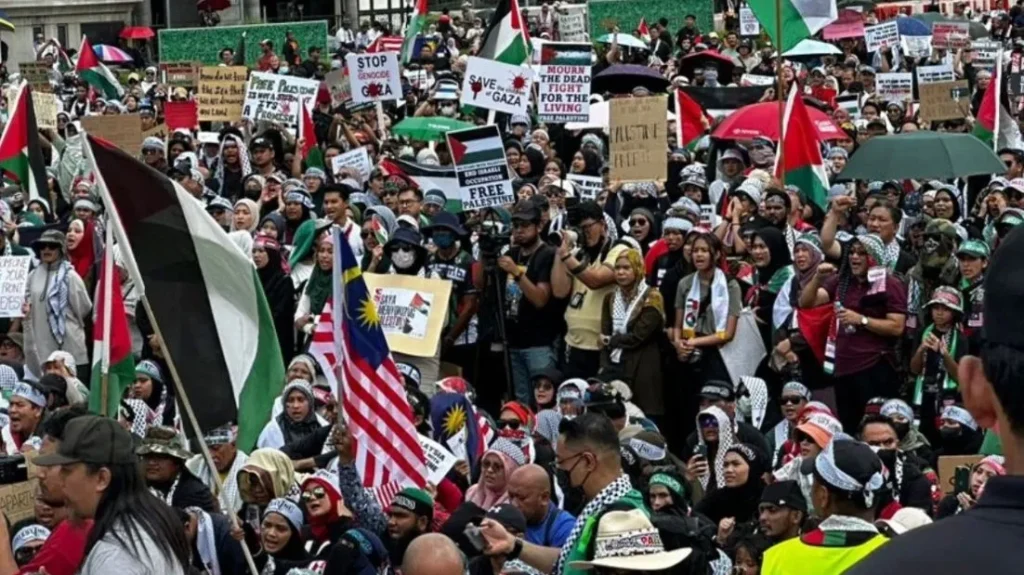
Controversial Arrest in the UK Sparks Debate on Freedom of Speech and International Criticism
A recent arrest in the United Kingdom has raised significant questions about freedom of speech and the boundaries of expressing one’s opinions, as a man has been detained for alleged criticism of the Palestinian situation. This arrest has ignited a heated debate over the fine line between exercising one’s right to free speech and potentially promoting hate speech, as well as the broader implications for discussing international issues that are sensitive and divisive.
The Arrest:
The arrest of the individual, whose name has not been disclosed for privacy reasons, took place in a small town in the UK after he expressed criticism regarding the Palestinian situation on his social media platforms. This controversial incident has left many wondering about the extent to which freedom of speech should be protected, especially when it comes to discussions about foreign policies and international conflicts.
The arrest has sparked widespread debate on social media, in political circles, and among human rights advocates, with many expressing concerns about potential overreach by authorities in limiting free speech.
Freedom of Speech vs. Hate Speech:
The arrest highlights the ongoing struggle to balance the principles of free speech with the necessity of preventing hate speech or incitement. Critics argue that while free speech should be protected, it becomes problematic when it evolves into hate speech or incitement of violence. In this case, authorities have cited concerns over potential hate speech and the need to investigate whether the individual’s comments may have incited hatred or violence.
Public Opinion and International Conflicts:
The incident also brings to the forefront the challenges that governments face when individuals express controversial opinions on international issues and foreign policies. The Palestinian-Israeli conflict, a deeply rooted and divisive matter, often triggers passionate responses from individuals who may have differing perspectives. In the era of social media and digital communication, it is easier than ever for such opinions to be disseminated widely.
Global Reactions:
The arrest has triggered reactions from around the world. Human rights organizations have expressed concern about the implications for freedom of speech and the potential chilling effect on discussions related to international issues. Many have argued that open dialogue and debate on such topics are essential for understanding and potentially resolving complex global conflicts.
The Legal Framework:
The legality of the arrest is a subject of significant debate. In the UK, as in many democratic nations, freedom of speech is a fundamental right, protected by the law. However, it is not an absolute right, and there are legal boundaries. Hate speech, incitement, and speech that can lead to violence or discrimination are not protected under the umbrella of free speech.
Investigation and Due Process:
Authorities have stated that the arrest was made to facilitate an investigation into the nature of the individual’s comments and whether they potentially fall under the category of hate speech or incitement. The arrest has prompted questions about the due process of the investigation and whether it will respect the individual’s right to a fair and impartial examination.
Debate Over the Arrest:
The controversial arrest has ignited a fierce debate within the UK and beyond. Critics argue that arresting an individual for expressing an opinion, even a controversial one, sets a dangerous precedent that could stifle open dialogue and prevent individuals from engaging in public discourse on sensitive international matters.
On the other hand, supporters of the arrest maintain that there must be a balance between freedom of speech and the prevention of speech that could incite hatred, discrimination, or violence. They argue that the arrest was necessary to investigate the potential consequences of the individual’s statements.
The Broader Context:
The Palestinian-Israeli conflict is a deeply entrenched and contentious issue that has garnered attention and strong opinions from people around the world. The UK, like many countries, is home to diverse communities with varying perspectives on the conflict. It is essential for nations to strike a balance between allowing free expression of opinions and protecting against the incitement of violence or discrimination.
The Role of Social Media:
In the digital age, social media platforms have become powerful tools for individuals to express their views and opinions. However, this convenience has also presented challenges in regulating and monitoring the vast amount of content shared online. The ease with which information spreads on social media has amplified the potential impact of individual statements, leading to concerns about their reach and consequences.
Global Repercussions:
This incident has raised awareness of the broader implications regarding the balance of free speech and hate speech, and its impact on discussions surrounding international conflicts. People around the world are closely watching the developments of this case as it unfolds.
The Way Forward:
As the investigation into the arrest continues, the case serves as a significant reminder of the complexities surrounding freedom of speech, particularly in an era where opinions can be easily disseminated through digital platforms. It also underscores the need for governments to carefully consider the boundaries of free speech when it comes to discussions about highly sensitive international issues.
The outcome of this case and the ensuing public debate will likely have a lasting impact on the way governments address and regulate speech on sensitive topics, both in the United Kingdom and in democratic nations around the world. Balancing the protection of free speech with the prevention of hate speech and incitement remains an ongoing challenge, and this arrest has amplified the importance of striking the right balance.







